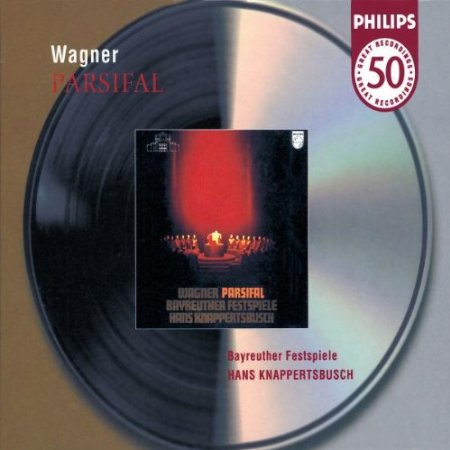Wagner Parsifal
View record and artist detailsRecord and Artist Details
Composer or Director: Richard Wagner
Genre:
Opera
Label: Philips
Magazine Review Date: 6/1986
Media Format: CD or Download
Media Runtime: 0
Mastering:
ADD
Catalogue Number: 416 390-2PH4

Tracks:
| Composition | Artist Credit |
|---|---|
| Parsifal |
Richard Wagner, Composer
Anja Silja, Flower Maiden II, Soprano Bayreuth Festival Chorus Bayreuth Festival Orchestra Dorothea Siebert, Flower Maiden IV, Soprano Elsa-Margrete Gardelli, Flower Maiden III, Soprano Georg Paskuda, Squire IV, Tenor George London, Amfortas, Baritone Gerd Nienstedt, Knight II, Bass Gerhard Stolze, Squire III, Tenor Gundula Janowitz, Flower Maiden I, Soprano Gustav Neidlinger, Klingsor, Bass Hans Hotter, Gurnemanz, Bass Hans Knappertsbusch, Conductor, Bass Irene Dalis, Kundry, Mezzo soprano Jess Thomas, Parsifal, Tenor Martti Talvela, Titurel, Bass Niels Møller, Knight I, Tenor Richard Wagner, Composer Rita Bartos, Flower Maiden V, Soprano Sona Cervená, Flower Maiden VI, Soprano Sona Cervená, Squire I, Soprano Ursula Boese, Squire II, Soprano |
Author: Alan Blyth
Transfer to CD leaves me in no doubt that this is the most moving and satisfying account of Parsifal ever recorded, and one that for various reasons will not easily be surpassed. Nobody today, not even Goodall, can match Knappertsbusch's combination of line and emotional power. Nobody else manages to sustain the breadth and gravity of Act 1 so effortlessly as ''Kna''—not even his own 1951 Decca mono LP Doppelganger; nobody quite equals his sense of searing remorse in the latter part of Act 2; none manages the architectural grandeur and solemnity of Act 3. The weight of the interpretation isn't compromised by slow tempos as it sometimes can be in the 1951 performance. All this makes the conductor, as Deryck Cooke once put it, ''quite incomparable'' in this work. As it happens, an essay of his extolling Knappertsbusch's reading happily accompanies this new issue. On it can be heard, at its most compelling, the magnificence of the Bayreuth chorus and orchestra, and the marvellous blend achieved between stage and pit that is Bayreuth's unique secret.
Another reason this version will be so hard to rival is the Wagnerian heights of achievement in the singing. As Robin Holloway commented in Opera on record (Hutchinson: 1979), ''Hotter is all-surpassing and makes every other Gurnemanz seem generalized''. Whether being sad, admonitory, spiritual or celebratory, this Gurnemanz commands the stage by virtue of warm, grand tone and verbal detailing. George London's Amfortas, also heard on the 1951 set, is as urgent and tormented as Amfortas should be, quite frightening in his anguished declamation. Neidlinger isn't a match for Uhde as Klingsor (1951), but his biting interpretation falls little short of Uhde's ideal.
Jess Thomas, a little too non-commital in Act 1 (though this standing-apart isn't wholly inappropriate), comes into his own in Act 2, playful with the Flowers, forcefully dismissive and pained with Kundry. Inspired by Hotter, he rises to heights of feeling in the Good Friday music. Only the touch of mysticism in the finale is missing. Dalis has always been accused of aping Modl, but that hardly worries me as her performance has presence and is articulated intelligently. The sensuousness of ''Ich sah das Kind'' is missing, however. Talvela is a sonorous, too youthful-sounding Titurel.
Spending an Easter listening to this deeply thought-out reading renewed my admiration for the work itself, somewhat lessened by recent unsatisfactory stage performances. Solti's Decca recording is due any moment on CD, Karajan's is already here (DG). They are both excellent performances, and the Decca will undoubtedly be enhanced by the new medium. But neither, obviously, can quite catch the very special Bayreuth aura, or indeed Knappertsbusch's total concept, and the vocal calibre of his cast, all heard so vitally now on CD.'
Another reason this version will be so hard to rival is the Wagnerian heights of achievement in the singing. As Robin Holloway commented in Opera on record (Hutchinson: 1979), ''Hotter is all-surpassing and makes every other Gurnemanz seem generalized''. Whether being sad, admonitory, spiritual or celebratory, this Gurnemanz commands the stage by virtue of warm, grand tone and verbal detailing. George London's Amfortas, also heard on the 1951 set, is as urgent and tormented as Amfortas should be, quite frightening in his anguished declamation. Neidlinger isn't a match for Uhde as Klingsor (1951), but his biting interpretation falls little short of Uhde's ideal.
Jess Thomas, a little too non-commital in Act 1 (though this standing-apart isn't wholly inappropriate), comes into his own in Act 2, playful with the Flowers, forcefully dismissive and pained with Kundry. Inspired by Hotter, he rises to heights of feeling in the Good Friday music. Only the touch of mysticism in the finale is missing. Dalis has always been accused of aping Modl, but that hardly worries me as her performance has presence and is articulated intelligently. The sensuousness of ''Ich sah das Kind'' is missing, however. Talvela is a sonorous, too youthful-sounding Titurel.
Spending an Easter listening to this deeply thought-out reading renewed my admiration for the work itself, somewhat lessened by recent unsatisfactory stage performances. Solti's Decca recording is due any moment on CD, Karajan's is already here (DG). They are both excellent performances, and the Decca will undoubtedly be enhanced by the new medium. But neither, obviously, can quite catch the very special Bayreuth aura, or indeed Knappertsbusch's total concept, and the vocal calibre of his cast, all heard so vitally now on CD.'
Discover the world's largest classical music catalogue with Presto Music.

Gramophone Digital Club
- Digital Edition
- Digital Archive
- Reviews Database
- Full website access
From £8.75 / month
Subscribe
Gramophone Full Club
- Print Edition
- Digital Edition
- Digital Archive
- Reviews Database
- Full website access
From £11.00 / month
Subscribe
If you are a library, university or other organisation that would be interested in an institutional subscription to Gramophone please click here for further information.




